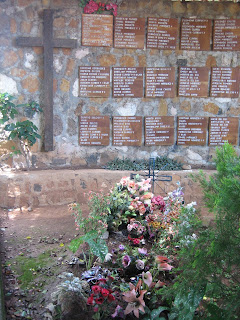Justice not advancing in El Mozote massacre case
The massacre of close to a thousand children, women, elderly and others at El Mozote and surrounding hamlets in El Salvador in December 1981 was one of the worst single human rights atrocities in the Americas. Forty two years later, those responsible for the crime against humanity remain unjudged and unpunished.
The most recent development unfolded in a US immigration court.
Judge Brian T. Palmer conceded that Atlacatl participated in “scorched earth” campaigns. “The Court finds ample evidence in the record that noncombatant civilians were deliberately killed by Atlacati Battalion soldiers,” he wrote in his decision. He also acknowledged that Atlacatl participated in El Mozote, that Garay Saravia participated in “Operation Rescate,” the military operation in which the massacre occurred, and that the officer “was assigned as a Section Leader, in some capacity, within the Battalion.”
But at the same time he dismissed the key portion of the testimony of expert witness Terry Karl, a Stanford University investigator and specialist on the Salvadoran civil war. Karl asserted during the hearings that Garay Saravia “incited, assisted, or otherwise participated” in the massacres mentioned in the deportation proceedings.
In his written opinion, the judge found there was insufficient evidence of where Garay Saravia was on specific dates at particular times:
The Court finds the DHS did not establish by clear and convincing evidence that the Respondent assisted or otherwise participated in the commission of deliberate killings or that the Respondent knew or should have known that his subordinates committed deliberate killings.
The Court made this finding despite what appeared to be ample evidence of the participation of the Atlcatl battalion in massacres and Garay Saravia's role in that unit. The irony of this military officer being allowed to continue to live in safety in the US, while tens of thousands of Salvadorans fleeing violence and persecution have been deported back to El Salvador, was quite apparent:
“It is a good thing that any court would require a high bar for evidence of individual responsibility before expelling someone from the country through deportation,” says Angelina Godoy, director of the University of Washington Center for Human Rights, who for years has worked to shed light on crimes from the Salvadoran armed conflict. “But it’s hard not to note the irony that this exact same immigration court system deports thousands of Salvadorans every year without affording them anywhere near the presumption of innocence shown to Mr. Garay.”
Contrary to what the ex-colonel's lawyers proclaimed, this was not an exoneration of Garay Saravia. It was simply a finding that, absent war records that the Salvadoran military has never released, and absent records which may still be in the archives of the US military, we still don't know the full story of his participation in this atrocity.
For a period of time, from 2016 to 2021, there was hope that justice might be achieved in a Salvadoran court. In 2016, the Constitutional Chamber of El Salvador's Supreme Judicial Court overturned the 1993 amnesty law which had prevented prosecutions of war crimes in El Salvador for more than two decades. With that ruling, the case of the massacre was reopened, and Judge Jorge Guzmán began receiving evidence and testimony in his small courtroom in San Francisco Gotera.
The case under Judge Guzmán's direction was about to enter its final phase leading to judgment when, in September 2021, Guzmán was removed from the case as part of the Bukele regime's purge of all judges 60 and older from the court system. The removal of Judge Guzmán capped a series of actions by Bukele which had thwarted progress in the case, as I wrote in December 2021.
Subsequently, Salvadoran judicial authorities placed judge Mirtala Teresa Portillo de Cruz in charge of the court proceedings. Portillo, however, has not moved the El Mozote massacre case forward since then. She has yet to hold a hearing in two years.The judicial process has not moved forward even though we have the names of people who are guilty. As a result of the dismissal of the judge (Guzmán), the case is left adrift almost two years later. Judge Mirtala wanted to get to know the proceeding but it is no longer with the same idea of following it up, but rather postponing it.
Remains of victims of the massacre continue to be found and exhumed in the area. In July, remains were delivered to two more victims' families.

Comments